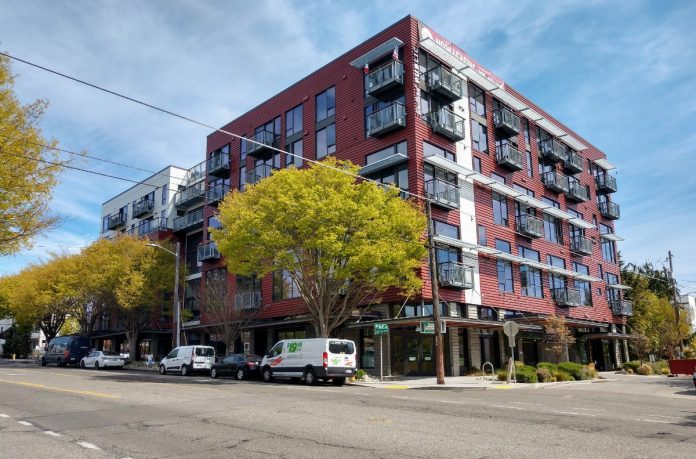On Tuesday, Governor Jay Inslee did something that normally would have made big news if not for police riots and Mayoral abdication of responsibility grabbing headlines. The Governor announced he was extending Washington’s statewide rent freeze and eviction moratorium through August 1st, providing some more breathing room for those under financial strain due to Covid-19 and the ensuing recession. Moreover, he made a clear path for the Seattle City Council (and other jurisdictions if they so choose) to debate and potentially pass a big business payroll tax to address its looming fiscal crisis and jumpstart affordable housing production that is still lagging far behind the region’s need.
Councilmembers Kshama Sawant and Tammy Morales have proposed a big business tax dubbed Tax Amazon, but consideration of their bill has been stymied by a strict interpretation of the state modified Open Public Meetings Act (OPMA) advanced by City Attorney Pete Holmes and not questioned by their city council colleagues. With the Governor’s clarification (which Council President M. Lorena González’s said she lobbied for), expect the big business tax debate to resume shortly.
Governor Inslee modified his OPMA order so that local governments can consider a wider range of legislation beyond his earlier condition of “routine and necessary” which was murky and unclear. His new emergency order states that online participation suffices to satisfy the exacting “in-person” meeting wording of the OPMA, which was not written with a pandemic in mind.
Rent Freeze
If your landlord (residential or commercial) attempts to raise your rent before August 1st, they’re breaking the law–unless they fall under a few narrow exemptions outlined in the order:
Landlords, property owners, and property managers are prohibited from increasing, or threatening to increase, the rate of rent for any dwelling, parcel of land occupied as a dwelling. Except as provided below, this prohibition also applies to commercial rental property if the commercial tenant has been materially impacted by the COVID-19, whether personally impacted and is unable to work or whether the business itself was deemed non-essential pursuant to Proclamation 20-25 or otherwise lost staff or customers due to the COVID-19 outbreak. This prohibition does not apply to commercial rental property if rent increases were included in an existing lease agreement that was executed prior to February 29, 2020 (preCOVID-19 state of emergency).
Governor Jay Inslee, 20-19.2 Coronavirus Evictions order
With small businesses really hurting and commercial rent payments down sharply, raising commercial rents would have been a bad idea for a landlord, anyway. Our leaders will likely need to come up with a way to support a small business rebound coming out of the recession. Commercial rent control is legal in Washington state, although the state legislature banned residential rent control in the Reagan years and has so far resisted calls to repeal the ban.
Modifications to the Eviction Moratorium
Some conditions of the eviction moratorium have been relaxed, while a few others have been sharpened to further protect tenants. The Governor’s Office described the modifications as follows:
- “Prohibiting retaliation against any tenant who invokes rights or protections under the proclamation;”
- “Permitting eviction based on property damage, except for damage that is not urgent in nature, including conditions that were known or knowable to the landlord prior to the COVID-19 crisis;”
- “Establishing a defense to any lawsuit for tenants if a landlord fails to offer a reasonable repayment plan;”
- “Establishing a minimum of a 14-day length of stay at a hotel, motel, or at other non-traditional dwelling situations in order to trigger the application of this proclamation to those dwelling situations;”
- “Allowing owners to evict tenants if the owner plans to occupy or sell the property, after providing at least 60 days’ notice; and”
- “Exempting commercial property rent increases that were executed in a rental agreement prior to the date the state of emergency was declared, on February 29.”
The Governor’s eviction relief is actually felt most outside of Seattle city limits. In May, the Seattle City Council extended Seattle’s eviction moratorium through the end of the year, outlasting the Governor’s new order. Seattle’s moratorium doesn’t come with a rent freeze though. It’s not as clear that a city council has the emergency powers that the Governor does to enact a temporary rent freeze. But perhaps the Washington State Legislature can finally act and remove the rent control ban to give cities options. This pandemic and recession is going to require bold steps.
Doug Trumm is publisher of The Urbanist. An Urbanist writer since 2015, he dreams of pedestrian streets, bus lanes, and a mass-timber building spree to end our housing crisis. He graduated from the Evans School of Public Policy and Governance at the University of Washington in 2019. He lives in Seattle's Fremont neighborhood and loves to explore the city by foot and by bike.


